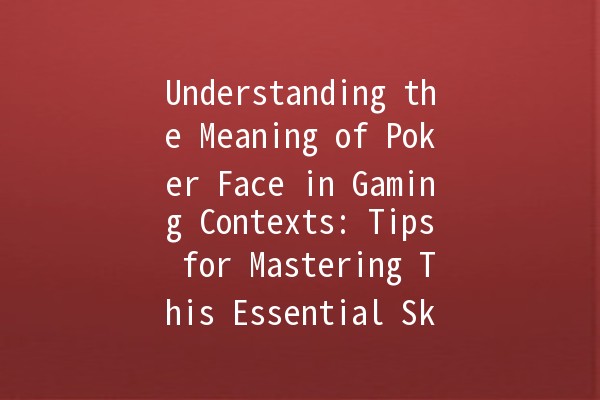When it comes to competitive gaming, the concept of having a "poker face" holds significant importance. Players often need to project confidence, maintain composure, and hide their true emotions, much like a professional poker player conceals their hand. In this article, we’ll delve into the meaning of "poker face" in gaming, alongside practical strategies to cultivate this essential skill for various games.
What is a Poker Face?
A "poker face" refers to a blank expression that conceals one's emotions—especially in situations of pressure or competition. The term originated from the game of poker, where players must keep a straight face to prevent opponents from reading their emotions and making strategic decisions.
In gaming, this concept transcends traditional card games. Whether you are engaging in video games or tabletop RPGs, maintaining a poker face can influence the dynamics of the game. The essence is to remain neutral and unreadable, thereby allowing you to execute strategies more effectively.
Why a Poker Face is Important in Gaming

Tips for Mastering the Poker Face in Gaming
Here are five actionable techniques to help you develop an effective poker face, enhancing your gaming prowess:
Explanation: Controlled breathing helps stabilize your emotions and maintain composure. It reduces anxiety, allowing you to focus.
Application: Before entering competitive scenarios, take deep breaths to center yourself. Inhale for four counts, hold for four, and exhale slowly for six. This technique can prevent emotional fluctuations, helping you keep a calm exterior during gameplay.
Explanation: Developing a habit of using neutral facial expressions can help you avoid revealing your emotional state.
Application: Practice in front of a mirror. Focus on relaxing your jaw, maintaining a neutral mouth position, and keeping your eyes still. The goal is to appear disengaged, yet attentive.
Explanation: Body language can sometimes betray your feelings even if your face is composed. Being aware of your posture and gestures is crucial.
Application: Adopt a relaxed yet alert posture. Avoid crossing your arms or showing rigid movements. Instead, maintain an open stance that indicates confidence without revealing tension. This can help portray a sense of calm that is beneficial in gaming settings.
Explanation: Training yourself to control immediate reactions can help you project a poker face consistently.
Application: In practice games or simulations, intentionally withhold any loud reactions when you win or lose. Instead, respond with minimal changes to your expression. Over time, this will condition you to manage your responses better during actual competitive situations.
Explanation: Visualization aids in preparing mentally for how you'll react in various gaming situations.
Application: Spend time visualizing different scenarios. Imagine critical game moments, like making a crucial move or facing overwhelming odds, and practice maintaining your poker face throughout. This mental rehearsal solidifies the mindset and physicality of your poker face.
Common Mistakes in Maintaining a Poker Face
Frequently Asked Questions
What Games Require a Poker Face?
Many games, especially strategybased titles like poker, blackjack, and certain video games (e.g., MOBAs, realtime strategy games) benefit from having a poker face. Situations where bluffing or misleading opponents is integral also rely on this skill.
Can Practicing a Poker Face Improve My Game Performance?
Yes, maintaining a poker face can enhance your gameplay by reducing emotional biases, helping you to focus on strategy rather than emotional responses. It gives you an edge by preventing opponents from reading your intentions.
Is a Poker Face Necessary for Casual Gaming?
While not as critical in casual settings, developing a poker face can still provide advantages. It helps you maintain composure, which can lead to a more enjoyable experience regardless of the stakes.
How Do I Handle Situations Where I Feel Overwhelmed?
If you're feeling overwhelmed, it's important to accept your emotions rather than suppress them. Instead of trying to maintain a poker face artificially, practice a technique like selfaffirmation to build your confidence. Remind yourself that it's acceptable to feel pressure, and channel that energy into focus rather than anxiety.
Can I Use My Eyes to Convey a Poker Face?
Absolutely! Your eyes can communicate a lot. Practice keeping your gaze steady and relaxed. Avoid extreme movements like rolling your eyes or narrowing them, as these can signal frustration or nervousness.
What If My Friends Know My Tells?
If you play regularly with the same group, they may pick up on your tells. To counteract this, consider deliberately altering your expressions and body language. This can keep them guessing and maintain your strategic advantage.
By integrating these techniques into your gaming practice, you can cultivate an effective poker face that enhances not only your performance but also your enjoyment of the game. Mastering the art of emotional control can transform your gameplay experience and solidify your reputation as a formidable opponent.
Mastering a poker face is not just about hiding emotions; it’s about understanding the psychological aspects of gameplay and refining your approach to competition. Remember to regularly practice the techniques shared in this article, and you will find that enhancing your poker face will significantly improve your gaming experience. Embrace the challenge and make every match a step towards becoming a more effective and confident player.